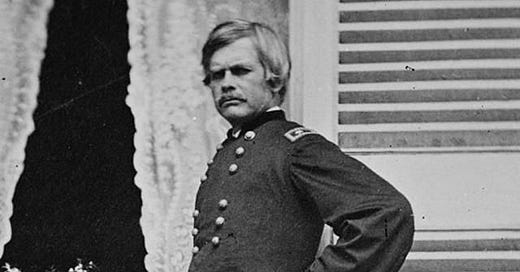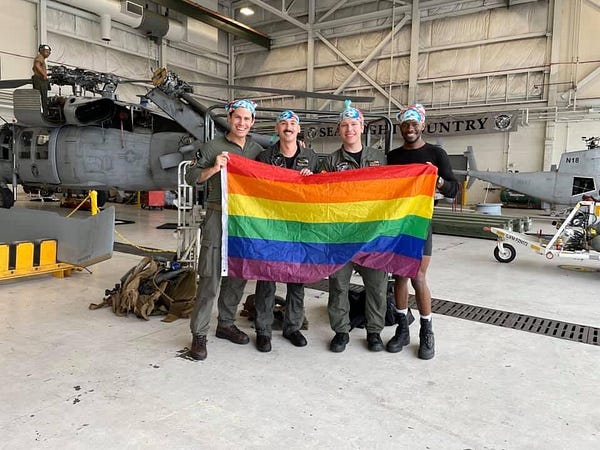Rum, [Redacted], and the Lash
In which the American military becomes really proud of you for having a cute boyfriend
For much of its history, the American military has had an aversion to hearing in any official way about the sexual conduct of servicemembers. In one of the US Army’s most notorious 19th-century legal conflicts, Captain Andrew Geddes reported from a remote post in Texas that Lieutenant Louis Orleman had been forcing his teenaged daughter to have sex; in a written statement to his commanding officer, Geddes wrote that Orleman “had been having sexual intercourse with her for the past five years, or since she was thirteen years of age, and that he had placed a loaded revolver to her head, threatening that he would blow out her brains if she did not consent to his horrible desires.” Thus informed, then-Brigadier General Edward Ord convened a court-martial — to conduct a trial of Captain Geddes, for putting such an appalling thing in writing.
As Louise Barnett concludes in her book about the trial, “acknowledging the possibility of incest by bringing charges against Orleman would have officially validated and magnified a scandal that would have haunted the Army, and the Department of Texas, for years to come. Fortunately for Orleman, this course of action was unthinkable because incest itself was unthinkable in America in 1879.”
Similarly, a rich and colorful history of the early American navy attempts to count recorded acts of sodomy at sea, and finds them buried in euphemism within official reports of sailor misconduct: “improper conduct too base to mention,” or “filthy conduct,” or “improper conduct on the berth deck.” As the historian James Valle has written, naval courts-martial finding themselves hearing testimony about shipboard sodomy tended to adjourn quickly, or to end testimony and immediately vote to acquit — after which the accused tended to vanish from a ship’s rolls, without explanation, the very next time the ship made port. “Consequently,” Valle concludes, in the early republic “not one navy man was ever convicted of homosexuality by a formal court-martial.” Herman Melville mentioned the unmentionable by writing, in White Jacket, of complaints regarding shipboard acts “from which the deck officer would turn away with loathing.” They didn’t want it to happen, but if it happened, they didn’t want to know about it.
The exceptions are, you know, interesting. In the early years of the Cold War, the sudden arrival of the threat posed by nuclear weapons and the emerging political power of the Eastern Bloc produced a moral panic in which security officials in the federal government hunted communists by looking for homosexuality; the “lavender scare” ran alongside the red scare. And so, as Elizabeth Lutes-Hillman has written, the Cold War military justice system became endlessly obsessed with sexual difference, throwing aside the usual disinclination to take notice of sexual behavior in the ranks: “Courts-martial instead became a performance of military values for the culture at large, setting the boundaries of deviant behavior for the armed forces, and so, to a certain extent, for the American body politic.” To drag that language about the performance of values down to the plane of action, Lutes-Hillman reports the example of the shore patrol in Norfolk, Virginia, which proudly reported in the late-1950s that it had caught 231 sailors in acts of sodomy by drilling holes in the wall of the local YMCA.
Putting all of that together, the American military has mostly preferred to avert its eyes from the sexual behavior of servicemembers, except in moments of transition and political crisis.1 If the armed forces are really interested in the question of which bed you spent the weekend in, Private Snuffy, something different is happening. For something more than 200 years, the default message from a company commander on Friday afternoon has generally been, “Handle your business, don’t interrupt my weekend with a phone call from a police department, and you’d best be in formation when the flag goes up on Monday morning.” Normal is the view that servicemembers are grown-ups whose intimate matters aren’t military business. Historically, if the armed forces officially have sex on the brain, something has been disrupted; anxiety and disorder outside the military have seeped into the ranks.
Now. To go back to an example from last year, this:
…suggests a number of obvious questions, starting with how did the United States Navy know this? Is this liberation, or is it intrusion? (BREAKING: The Department of the Navy proudly announces which helicopter pilots are into dudes, and stand by for detailed information on which surface warfare officers are bi-curious. We’re still asking around on that one, so.) It’s like the shore patrol is drilling holes in the wall at the YMCA again, but this time it’s so they can bus in a cheering section. The chain of command is right outside your door, you guys, and we hear what you’re doing in there, and OH MY GOD WE’RE SO PROUD OF YOU DO YOU NEED SOME CONDOMS? The Department of Defense isn’t a regular mom, it’s a cool mom.
I bring this up at this moment because, shortly after the disgraceful end of a twenty-year debacle in Afghanistan that made the Taliban more powerful, the Department of Defense is thinking deeply about…social justice and gender equity. Behold the Equity Action Plan — which, as a simple test of wokeness, uses the please-stop-doing-that word “Latinx.”
In an era of increasingly hapless American military power and wars that wander around for a decade or two before they just kind of end in a whoopsie, the leaders of the armed forces have turned into the reboot of Sex and the City. We lost some wars and stuff, but anyway, we’re burning the midnight oil to nail down a transgender equity policy and develop “collaborative partnerships with affinity groups.”
You may not have noticed this, because it’s kind of not a big deal in the news, but the Biden administration has proposed a massive increase in the military budget for the upcoming fiscal year — to $773 billion — along with a substantial reduction in available military force: fewer soldiers, significantly fewer ships, and so on. More for less, budget increase plus force reduction. As usual, Ward Carroll has the most interesting things to say about it:
So I’m inclined to view the pivot to equity as an example of another American institution that’s turning its attention to other stuff because it no longer knows how to do the main stuff, the thing for which it exists. While Elon Musk is pushing hard for Mars, NASA is sharpening its own equity plan; while the Taliban enjoys its new inventory of weapons, the Department of Defense is fighting to understand whiteness. As we slide into a brutal recession later this year, look for the Federal Reserve Bank to open an urgent discussion about transgender equity in the banking industry. It’s The Pivot™: It’s what we do instead of doing what we actually do. It’s distraction wearing liberation’s borrowed uniform.
Earlier:
Social History Is in Your Pants
I have never told this story without offending someone, so consider skipping it, but on the subject of the military preferring not to know:
The very first time anyone told me about the Uniform Code of Military Justice, I was a recent arrival at the Benning School for Boys, meeting the nice man in his round brown hat.
One day the nice man marched us to a classroom to meet a JAG Corps captain, assigned as a prosecutor, who talked about himself in the third person. Captain Walters told us about the new set of laws we’d be subject to as soldiers: If you do this shit right here or this shit right here or this shit right here, you’ll be seeing Captain Walters again, and I’ll tell ya what, boys, you ain’t gonna like it.
In the middle of all that I’ll-fry-you-like-an-egg stuff, Captain Walters dropped the sex stuff on us. He told us that it was, and I quote, “technically” a violation to have sex out of wedlock, and the UCMJ called that “adultery,” and so he was supposed to tell us not to do that, and he was supposed to warn us that, in theory, we could be prosecuted for it. But I’ll tell ya what, boys, and this is the part you should skip if you need to, Captain Walters ain’t married, and I guarantee ya he ain’t sayin’ no to the pussy, hooah? And then he told us the same thing about the “technical” prohibition on oral sex, and you’ll never guess what he said next.
So the very first time anyone in uniform told me what the military thought of my own sexual behavior as a soldier, the very first thing he said was that he didn’t care and didn’t bother to follow any of the same laws himself, because no one cared about them at all. Going by the things I saw at the Lucky Seven lounge on Victory Boulevard, this was no joke. As an official matter, no one wanted to hear about it.







I was not offended by the story, though it's the kind of thing that would drive females in my family nuts.
this does not end well... nothing shocks me anymore.